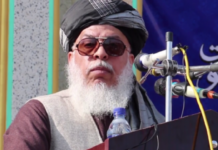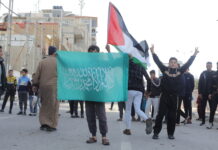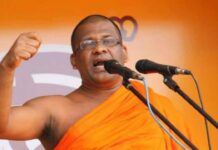Saudi Arabia and the United States have been celebrating “75 years of strategic partnership” in a series of events over the past week including a re-enactment of the first meeting between President Franklin D Roosevelt and King Abdulaziz ibn Saud in 1945.
Saudi Arabia has been a key partner militarily, politically and economically with the U.S. since World War 2. Most controversially, Riyadh invited hundreds of thousands of U.S. troops onto its soil in 1990 as a launchpad to invade Iraq.
U.S. ambassador to Saudi Arabia, John Abizaid, made an address in Riyadh on Friday.
He said: “President Franklin Roosevelt and King Abdulaziz met to chart the future of our bilateral ties. This first encounter between a U.S. president and a Saudi King laid the foundation for the broad strategic partnership the United States and Saudi Arabia share today.
“Beyond partnership, President Roosevelt and King Abdulaziz forged a personal friendship that is at the heart of the strong ties our two countries share today…
“The historic meeting aboard the U.S.S. Quincy launched a partnership that has brought our people together to deliver an unprecedented record of successes. Americans and Saudis built the global energy system that has been so crucial to the steady growth of the world’s economy. During the Cold War, we stood together against Communism and Soviet aggression.
“In 1991 our joint forces liberated Kuwait. We have stood shoulder to shoulder to oppose threats to the region, especially terrorism. Our citizens have learned from one another through a rich slate of exchange programs. Hundreds of thousands of Saudis have visited, studied, and worked in the United States.
Subscribe to our newsletter and stay updated on the latest news and updates from around the Muslim world!
“Similarly, hundreds of thousands of Americans have undertaken pilgrimage to Makkah and Medina and have worked in the Kingdom to build our strong business, educational, and security ties.
“And we continue to work together. American companies are working to ensure the success of Vision 2030. Our militaries work together to bring stability and security to the region, even as Iran continues its campaign of aggression.
On Sunday an event was held on the deck of the U.S.S. Farragut near Jeddah to reenact the famous moment when President Franklin D. Roosevelt met King Abdul Aziz.
Commander of the U.S. Naval Forces Central Command Admiral James Malloy told Arab News that the tight-knit relationship with the Kingdom will ensure regional security.
“Because it’s a tight cooperation, it responds to threats in the region. Threats in the maritime, threats to the free flow of commerce, whether it is state-sponsored or non-state-sponsored, we both recognise that this threatens the region as a whole. When that happens, you call your close friends and our closest friends are the Saudi Royal Naval Forces,” said Malloy.
And writing in the Arab News Princess Reema bint Bandar Al-Saud, Saudi Arabia’s Ambassador to the United States, said the Saudi-U.S. alliance has:
- Partnered to defeat communism
- Ensured stable global energy markets
- Reversed Saddam Hussein’s invasion of Kuwait
- Led a global campaign to eliminate Al-Qaeda and ISIS
- Coordinated counterterrorism efforts that have saved thousands of innocent lives
- And delivered unprecedented economic development to the Arab world
She wrote: “King Abdul Aziz and President Roosevelt both understood that what was at stake was far more than just the immediate recovery of post-war Europe and Germany.
“These two leaders saw this as the time for new alliances and partnerships that would expand existing bilateral relationships, forge new economic ties and create new international institutions that would be essential for global peace and security.
“Both leaders recognized that establishing a sustained and lasting global stability would require new international bonds — and that if the US and Saudi Arabia were to help develop this new approach to global, collective security — both leaders and both nations would need to look beyond their own provincial interests. As it would turn out, what was good for both nations, was also good for the world.”



















